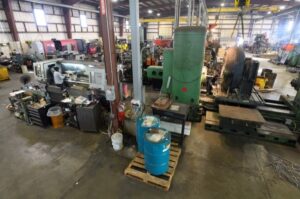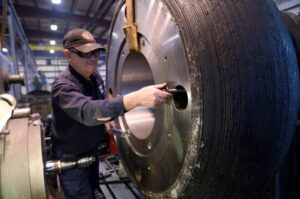Here are some of the key benefits of repairing industrial equipment:
Cost Savings: One of the most significant advantages of repairing industrial equipment is cost savings. Repairing equipment is often more cost-effective than purchasing new machinery, which can be a substantial capital expenditure. With interest rates and inflation growing higher each day businesses with budget constraints will need to consider this carefully before buying a new piece of equipment.
Extended Equipment Lifespan: Proper maintenance and repairs can significantly extend the service life of industrial equipment. This allows businesses to maximize the return on their initial investment and delay the need for costly replacements.
Reduced Downtime: Buying new machinery often involves downtime for installation, setup, and employee training. Repairing existing equipment can minimize production disruptions, helping businesses maintain operational efficiency and meet production targets.
Familiarity and Expertise: Employees are typically familiar with the operation and maintenance of existing equipment. Repairing industrial machinery allows companies to leverage their workforce’s expertise without the need for extensive retraining.
Customization: Many industrial processes are highly specialized and may rely on equipment customized for specific tasks. Replacing such equipment with new machinery can necessitate significant process changes and additional customization costs.
Historical Reliability: If the industrial equipment has a proven track record of reliable performance and has consistently met production requirements, repairing it can be a sensible choice.
Compliance with Regulations: Upgrading to new equipment may require compliance with updated regulations and safety standards, which can be time-consuming and costly. Repairing existing machinery can provide a faster path to meeting these requirements.
Spare Parts Availability: Over time, businesses may accumulate spare parts for their industrial equipment, making it easier and more cost-effective to perform repairs, especially for older or custom-made machines.
Environmental Considerations: Repairing industrial equipment is often a more sustainable choice than disposing of it and acquiring new machinery. It reduces waste and aligns with environmental sustainability goals.
Preservation of Intellectual Property: Repairing industrial equipment can help maintain the intellectual property associated with its design and operation, which can be valuable for businesses with proprietary processes.
Risk Mitigation: Purchasing new machinery carries risks related to technology compatibility, reliability, and performance. Repairing existing equipment with a known track record can be a more risk-averse approach that minimizes uncertainties.
Depreciation Benefits: From an accounting perspective, older equipment may have already undergone significant depreciation, which means the remaining book value of the equipment may be lower than its actual value. Repairing can be a financially advantageous option in such cases.






